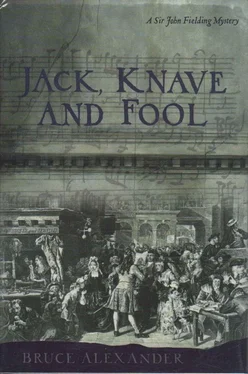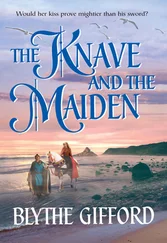Bruce Alexander - Jack, Knave and Fool
Здесь есть возможность читать онлайн «Bruce Alexander - Jack, Knave and Fool» весь текст электронной книги совершенно бесплатно (целиком полную версию без сокращений). В некоторых случаях можно слушать аудио, скачать через торрент в формате fb2 и присутствует краткое содержание. Год выпуска: 1999, ISBN: 1999, Жанр: Исторические приключения, на английском языке. Описание произведения, (предисловие) а так же отзывы посетителей доступны на портале библиотеки ЛибКат.
- Название:Jack, Knave and Fool
- Автор:
- Жанр:
- Год:1999
- ISBN:9780786217984
- Рейтинг книги:4 / 5. Голосов: 1
-
Избранное:Добавить в избранное
- Отзывы:
-
Ваша оценка:
- 80
- 1
- 2
- 3
- 4
- 5
Jack, Knave and Fool: краткое содержание, описание и аннотация
Предлагаем к чтению аннотацию, описание, краткое содержание или предисловие (зависит от того, что написал сам автор книги «Jack, Knave and Fool»). Если вы не нашли необходимую информацию о книге — напишите в комментариях, мы постараемся отыскать её.
Jack, Knave and Fool — читать онлайн бесплатно полную книгу (весь текст) целиком
Ниже представлен текст книги, разбитый по страницам. Система сохранения места последней прочитанной страницы, позволяет с удобством читать онлайн бесплатно книгу «Jack, Knave and Fool», без необходимости каждый раз заново искать на чём Вы остановились. Поставьте закладку, и сможете в любой момент перейти на страницу, на которой закончили чтение.
Интервал:
Закладка:
“And the last you saw of that bottle of wine, it was rolling around on the floor up there?”
“That’s true, sir,” said I, “spilling its contents all round.”
“Then take me up to the stage, for we must restore order somehow, clear the area, and find that bottle.”
“Yes, Sir John. Grab hold my shoulder.”
The crowd up on the stage seemed to have increased threefold by the time Sir John and I arrived. He tried shouting them down. Yet his considerable voice was lost in the tumult. Then had I an idea of what might be done. We stood in the midst of the orchestra, or where the orchestra had been minutes before. If I might but …
“Here, Sir John,” said I, “let me help you up on a chair. If I can reduce them to something like silence, you may deliver one of your magnificent threats.”
“Well and good,” said he. “Do what you can.”
Taking my hand, he made it up to the seat of the chair. I then helped point him in the right direction and urged him not to move, lest he fall. Then did I go right swift to the orchestra’s loudest instrument, which stood untended.
I picked up the mallets — covered in sheepskin they were — and I began beating upon the kettledrums as Tom O Bedlam might, making them boom forth like cannon, then rolling them out long and loud like thunder, then booming and banging again and again.
When I looked up and saw all turned toward me, openmouthed in surprise, I knew that I must stop. Reluctantly, I did so. Then rang forth the stentorian voice of the great man himself.
“I am Sir John Fielding, Magistrate of the Bow Street Court. I order you all to clear the stage at once. With the exception of Lord Laningham, members of his immediate family, and Gabriel Donnelly, the doctor in attendance, all must leave immediately. The Bow Street Runners have been sent for to enforce this order. All who remain in defiance of it may expect to spend the next month in Newgate Gaol.”
What a rush there was! Musicians and chorus fled out the door at the rear of the stage. Those of the audience who had come up out of curiosity or concern left, as they had come, by the steps at either side. In less than three minutes, only Lord Laningham, Mr. Donnelly, and a grandly dressed woman whom I took to be Lady Laningham, remained there with us.
But look as I might — and I spent the next ten minutes poking in every corner — no bottle of any sort was there to be found.
TWO
The men of our table at the Crown and Anchor assembled once again in Sir John’s chambers back of the courtroom at Number 4 Bow Street. It had been over an hour since Lord Laningham had fallen so sudden ill upon the stage and died so ingloriously before hundreds of witnesses. While some had filed out immediately, aware that the musical entertainment was not likely to resume, which of course it did not, most remained, some no doubt out of concern for the aged noble, but the greater number simply to gawk at a man in the throes of death. At last death had come and taken him. Lady Laningham, who had knelt beside him through all, then gave the word and two servers of the Crown and Anchor hauled off the body between them to an embalmer nearby on Fleet Street.
That done, Sir John had allowed back the musicians and members of the chorus to retrieve their instruments and music from the stage; then did he send me off to find the innkeeper and bring him hither. It did not surprise me that he who had acted as the master of the ceremonies proved to be the one I sought. He went most willingly to Sir John; I merely trailed after. Yet I was then sent off to find Annie and bring her to the table, so that I heard nothing of the question and answer that passed between them. Instead I lound her with the choirmaster, he giving her a stern talking-to, one complete with linger shaking and frown. Whatever she had done seemed to have displeased him greatly. Nevertheless I heard no details, for as I approached close enough to listen there was, of a sudden, nothing to be heard. He turned from her and stalked off, perhaps in search of some other poor soprano he might abuse. All this took place in the space behind the stage reached through that door through which both orchestra and choir had passed. Asking simply if we were ready now to return to Bow Street, Annie came along, music in hand, accepting my response that it would be soon.
And so it was. Sir John was at the table with the rest — his interview with the innkeeper could not have lasted long — and we all set off together, among the last to leave the scene of that unhappy event. He declined to discuss it, saying that he wished to give it some thought as we made our way home. “If, however,” he had said on the walkway before the Crown and Anchor, “you gentlemen wish to accompany us, I would be curious to hear your comments and observations on the matter. Perhaps we might do that at Number Four.”
They had indeed wished to come along, and though they could not wait to talk of the death amongst themselves, Messrs. Donnelly, Goldsmith, and Humber trailed our party at such a distance that they could not have greatly disturbed Sir John. Upon our arrival at Bow Street, Lady Fielding and Annie had mounted the stairs to our quarters, and I, on Sir John’s orders, had gone ahead to light candles in his chambers and otherwise prepare it for his guests.
Thus, when they entered, the place was well lit, and upon Sir John’s desk stood a bottle of good brandy (fetched from the bottom drawer of his desk) and four glasses, wiped clean and ready.
“Ho!” crowed Mr. Goldsmith in celebration. “What have we there? Is it the Spanish fundador or the French cognac?”
“I know not its country of origin,” said Sir John, “only that it has a pleasant taste and warms the stomach well.”
“Well and good,” spoke Mr. Humber.
I filled glasses for all but myself and handed them out. They took chairs scattered about the room and pulled them close. I, not being asked to leave, found one for myself, as well.
“Sir John?”
“Yes, Mr. Goldsmith?”
“Your interest in this matter seems to indicate a suspicion that Lord Lan-ingham did not die of natural causes.”
“Oh … not necessarily. As described by Jeremy, the scene upon the stage following Laningham’s collapse was one of great disorder. At the very least, I thought it wise to clear the stage that Mr. Donnelly might minister to the poor man. That, following Jeremy’s solo on the bass drum, I was able to do.”
“And grateful I am to you both,” said Mr. Donnelly.
“On the other hand,” said Sir John, “the order of events prior to his collapse, again described to me by Jeremy, were such that the possibility of an unnatural death cannot be dismissed.”
“But why?” said Mr. Goldsmith, ever the doubter.
“Yes, why?” echoed Mr. Humber. “Lord Laningham was most certainly of an age for dying — seventy-five years, as I understand. He’d a bad heart and one attack of apoplexy known to me.”
“You seem to know a good deal about his former state of health,” said Sir John.
“That, Jack,” said Mr. Humber, “is because I had been critical a year past of Laningham’s behavior at the concerts, and I was told all this by a medico who happened to be at my table. It was his opinion that Lord Laningham was attempting with all his foolish jumping about to prove himself fit and hale in spite of his years.”
“There, you see, sir?” said Mr. Goldsmith. “That seems well vouched for. In light of all that, how is it you still harbor a suspicion — be it even a mild one?”
“Well, first of all, Mr. Goldsmith — and you also, Alfred — because I am a magistrate, it is my place and my duty to harbor suspicions of all sorts. It is true that I often put a dark interpretation upon a set of facts — yet also true that as often as not such a view is proven justified. When in the back of my mind I have some doubt — not a thought but a feeling — there is usually good reason for it. I have come to trust my doubts.”
Читать дальшеИнтервал:
Закладка:
Похожие книги на «Jack, Knave and Fool»
Представляем Вашему вниманию похожие книги на «Jack, Knave and Fool» списком для выбора. Мы отобрали схожую по названию и смыслу литературу в надежде предоставить читателям больше вариантов отыскать новые, интересные, ещё непрочитанные произведения.
Обсуждение, отзывы о книге «Jack, Knave and Fool» и просто собственные мнения читателей. Оставьте ваши комментарии, напишите, что Вы думаете о произведении, его смысле или главных героях. Укажите что конкретно понравилось, а что нет, и почему Вы так считаете.












